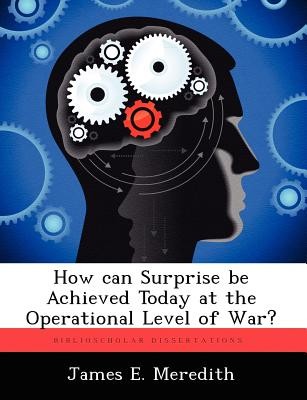
- We will send in 10–14 business days.
- Author: James E Meredith
- Publisher: BiblioScholar
- ISBN-10: 1249366836
- ISBN-13: 9781249366836
- Format: 18.9 x 24.6 x 0.6 cm, softcover
- Language: English
- SAVE -10% with code: EXTRA
How Can Surprise Be Achieved Today at the Operational Level of War? (e-book) (used book) | bookbook.eu
Reviews
Description
The primary purpose of this study is to determine how surprise can be achieved today at the operational level of war. Two supporting questions are answered as well. These are: What are the theoretical and historical foundations for the concept of surprise? And, specifically, what are the ways, means, and effects (ends) of achieving surprise at the operational level of war? The theory of surprise can be drawn from the writings of both classical and contemporary theorists. Leading military theorists who discuss the element of surprise include Sun Tzu, Carl von Clausewitz, Baron de Jomini, J.F.C. Fuller, B.H. Liddell Hart, M.M. Kiryan, V. YE. Savkin, Michael Handel and Edward Luttwak. These theorists provide assertions about the desirable effects (ends) of surprise and the various ways and means to achieve those effects. Three historical case studies of campaigns and major operations undertaken during the period 1944 to 1950 are examined for evidence of these theoretical assertions. These case studies include Cobra (1944), Manchuria (1945), and Inchon (1950).
EXTRA 10 % discount with code: EXTRA
The promotion ends in 16d.16:20:33
The discount code is valid when purchasing from 10 €. Discounts do not stack.
- Author: James E Meredith
- Publisher: BiblioScholar
- ISBN-10: 1249366836
- ISBN-13: 9781249366836
- Format: 18.9 x 24.6 x 0.6 cm, softcover
- Language: English English
The primary purpose of this study is to determine how surprise can be achieved today at the operational level of war. Two supporting questions are answered as well. These are: What are the theoretical and historical foundations for the concept of surprise? And, specifically, what are the ways, means, and effects (ends) of achieving surprise at the operational level of war? The theory of surprise can be drawn from the writings of both classical and contemporary theorists. Leading military theorists who discuss the element of surprise include Sun Tzu, Carl von Clausewitz, Baron de Jomini, J.F.C. Fuller, B.H. Liddell Hart, M.M. Kiryan, V. YE. Savkin, Michael Handel and Edward Luttwak. These theorists provide assertions about the desirable effects (ends) of surprise and the various ways and means to achieve those effects. Three historical case studies of campaigns and major operations undertaken during the period 1944 to 1950 are examined for evidence of these theoretical assertions. These case studies include Cobra (1944), Manchuria (1945), and Inchon (1950).


Reviews